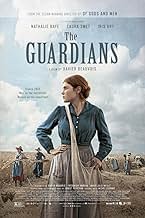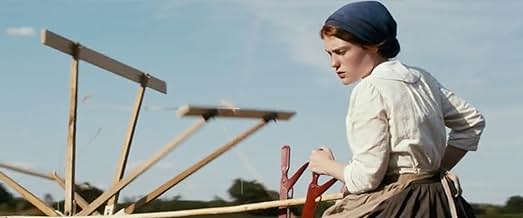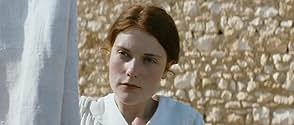IMDb-BEWERTUNG
6,7/10
2701
IHRE BEWERTUNG
Im Ersten Weltkrieg bewirtschaften die zurückgelassenen Frauen den Hof der Familie.Im Ersten Weltkrieg bewirtschaften die zurückgelassenen Frauen den Hof der Familie.Im Ersten Weltkrieg bewirtschaften die zurückgelassenen Frauen den Hof der Familie.
- Auszeichnungen
- 11 Nominierungen insgesamt
Mathilde Viseux
- Marguerite Sandrail
- (as Mathilde Viseux-Ely)
Empfohlene Bewertungen
I thought the film was mediocre. The ending definitely left me confused and wondering what happened with the rest of the film.
Photography is beautiful and the actors do their best with a script which is anaemic in comparison with the novel on which the film is based. Many of the more interesting characters in the book are omitted, along with half of the setting - the people who live on the waterways. The ending is unbelievable.
This movie does not move quickly. But it is beautifully filmed and well acted by a group of actresses headed by Natalie Baye. Not for the impatient, but it will be appreciated by those who can take the time to let it have an effect.
This is life on the home front, in the country The other side of war. No one shot at these women, but their lives were still difficult.
Interesting that the depiction of American soldiers is largely negative. They have plenty of money, and are not interested in "the locals" other than as sex objects.
This is life on the home front, in the country The other side of war. No one shot at these women, but their lives were still difficult.
Interesting that the depiction of American soldiers is largely negative. They have plenty of money, and are not interested in "the locals" other than as sex objects.
In his film "Of Gods and Men," director Xavier Beauvois tells the story of seven Roman Catholic French Trappist monks kidnapped by radical Islamists from their monastery in a village in Algeria during the Algerian Civil War, and the sacrifices that people of good will in both religions were willing to make. Sacrifice is also a theme of Beauvois latest film, The Guardians, his first film shot in digital. It is a superbly realized and emotionally engaging film that dramatizes the strength and courage of the women left behind during World War I when all able-bodied men were fighting in the trenches. A quiet, contemplative film, it is beautifully photographed by Caroline Champetier ("The Innocents") who captures the bucolic loveliness of the Limousin area of south central France.
Now part of the new region of Nouvelle-Aquitaine, it is the least populated region of Metropolitan France and most likely has not changed much since the years in which the film takes place. Based on a 1924 novel by war veteran Ernest Pérochon, Beauvois and his co-writers Frédérique Moreau and Marie-Julie Maille gradually reveal the impact of the war on one family whose two sons and son-in-law have left for the front. Supported by a moving score by Michelle Legrand ("The Price of Fame"), the film covers a period of five years from 1915 to 1920, the years during and following the Great War in Europe, one that would claim an estimated 45 million military dead and wounded and 7.7 million missing or imprisoned.
The film opens in 1915 in a combat zone where we see the bodies of dead soldiers lying in the mud. The scene abruptly shifts to the Paridier farm in France, a place of quiet beauty that stands in sharp contrast to the heartbreak of the battlefield. It is a difficult time for the farm run by widowed matriarch Hortense Sandrail (Nathalie Baye, "Moka") with the help of her daughter Solange (Laura Smet, "Yves Saint-Laurent," Baye's real-life daughter) and her elderly father Henri (Gilbert Bonneau). Beauvois shows the heroism of the women furrowing, seeding, harvesting, grinding wheat, and taking it to market. It is backbreaking work and will be years before combines and tractors are introduced.
As the men periodically return home on leave, it becomes clear that each of them is damaged in some way. Hortense's oldest son Constant (Nicholas Giraud, "Anton Chekhov 1890"), a former schoolteacher, tells his mother that he endured, "two years of hell, some people went mad," and says without any evidence that "after the war, it will be different." Clovis (Olivier Rabourdin, "My Golden Days"), Solange's husband drinks heavily and stands up for the humanity of the Germans ("they are just like us") in opposition to the feelings of the family and the community. Finally, it is Hortense's son Georges (Cyril Descours, "Red Sky") who carries himself with a certain pride and even arrogance.
Frustrated by the need for another person to help her run the farm during the harvest season, Hortense hires Francine, a twenty-year-old auburn-haired orphan, remarkably performed by newcomer Iris Bly. In addition to the chores, Hortense must contend with some rowdy American soldiers stationed in the village awaiting their orders, while also looking after Marguerite (Mathilde Viseux), Clovis's daughter from his first marriage. Complications arise when Francine and George fall in love, much to the chagrin of the much younger Marguerite, assumed to be the girl that George would marry. The friction between members of the family forms the centerpiece of the film and Beauvois weaves a complex and unpredictable story without resorting to melodrama.
Unfortunately, when the town's rumor mill goes into high gear spreading all kinds of rumors, Francine's future is left on shaky ground. Even more disturbing is the sad news from the front delivered by a local official who just appears at the door. As events unfold, we are drawn closer to each character, able to relate to their hopes and sorrows as if we have known them all of their lives. Though The Guardians is a film of subtlety and restraint, it is also a work of compelling emotional force and one of the year's best films.
Now part of the new region of Nouvelle-Aquitaine, it is the least populated region of Metropolitan France and most likely has not changed much since the years in which the film takes place. Based on a 1924 novel by war veteran Ernest Pérochon, Beauvois and his co-writers Frédérique Moreau and Marie-Julie Maille gradually reveal the impact of the war on one family whose two sons and son-in-law have left for the front. Supported by a moving score by Michelle Legrand ("The Price of Fame"), the film covers a period of five years from 1915 to 1920, the years during and following the Great War in Europe, one that would claim an estimated 45 million military dead and wounded and 7.7 million missing or imprisoned.
The film opens in 1915 in a combat zone where we see the bodies of dead soldiers lying in the mud. The scene abruptly shifts to the Paridier farm in France, a place of quiet beauty that stands in sharp contrast to the heartbreak of the battlefield. It is a difficult time for the farm run by widowed matriarch Hortense Sandrail (Nathalie Baye, "Moka") with the help of her daughter Solange (Laura Smet, "Yves Saint-Laurent," Baye's real-life daughter) and her elderly father Henri (Gilbert Bonneau). Beauvois shows the heroism of the women furrowing, seeding, harvesting, grinding wheat, and taking it to market. It is backbreaking work and will be years before combines and tractors are introduced.
As the men periodically return home on leave, it becomes clear that each of them is damaged in some way. Hortense's oldest son Constant (Nicholas Giraud, "Anton Chekhov 1890"), a former schoolteacher, tells his mother that he endured, "two years of hell, some people went mad," and says without any evidence that "after the war, it will be different." Clovis (Olivier Rabourdin, "My Golden Days"), Solange's husband drinks heavily and stands up for the humanity of the Germans ("they are just like us") in opposition to the feelings of the family and the community. Finally, it is Hortense's son Georges (Cyril Descours, "Red Sky") who carries himself with a certain pride and even arrogance.
Frustrated by the need for another person to help her run the farm during the harvest season, Hortense hires Francine, a twenty-year-old auburn-haired orphan, remarkably performed by newcomer Iris Bly. In addition to the chores, Hortense must contend with some rowdy American soldiers stationed in the village awaiting their orders, while also looking after Marguerite (Mathilde Viseux), Clovis's daughter from his first marriage. Complications arise when Francine and George fall in love, much to the chagrin of the much younger Marguerite, assumed to be the girl that George would marry. The friction between members of the family forms the centerpiece of the film and Beauvois weaves a complex and unpredictable story without resorting to melodrama.
Unfortunately, when the town's rumor mill goes into high gear spreading all kinds of rumors, Francine's future is left on shaky ground. Even more disturbing is the sad news from the front delivered by a local official who just appears at the door. As events unfold, we are drawn closer to each character, able to relate to their hopes and sorrows as if we have known them all of their lives. Though The Guardians is a film of subtlety and restraint, it is also a work of compelling emotional force and one of the year's best films.
I was smitten by Iris Bry as Francine and entranced by the film, thinking about French landscape from a different point of view in those war years. If you love film, sit back and enjoy a wonderful story that differs from the usual WW1fare.
Wusstest du schon
- WissenswertesThe film, starring Nathalie Baye and her real life daughter Laura Smet, was released the same day Johnny Hallyday, Laura's father, died.
- PatzerIn the opening scene, which is set in 1915, the dead German soldiers are wearing the later style helmets that were not introduced until at least a year later.
- SoundtracksLa Chanson des Blés d'Or
Music by Frédéric Doria
Lyrics by Camille Soubise and L. Lemaître
Performed by Iris Bry
Top-Auswahl
Melde dich zum Bewerten an und greife auf die Watchlist für personalisierte Empfehlungen zu.
- How long is The Guardians?Powered by Alexa
Details
- Erscheinungsdatum
- Herkunftsländer
- Offizielle Standorte
- Sprachen
- Auch bekannt als
- The Guardians
- Drehorte
- Montrol-Sénard, Haute-Vienne, Frankreich(village church and school)
- Produktionsfirmen
- Weitere beteiligte Unternehmen bei IMDbPro anzeigen
Box Office
- Budget
- 8.900.000 € (geschätzt)
- Bruttoertrag in den USA und Kanada
- 177.331 $
- Eröffnungswochenende in den USA und in Kanada
- 7.479 $
- 6. Mai 2018
- Weltweiter Bruttoertrag
- 4.167.608 $
- Laufzeit2 Stunden 18 Minuten
- Farbe
- Seitenverhältnis
- 2.39 : 1
Zu dieser Seite beitragen
Bearbeitung vorschlagen oder fehlenden Inhalt hinzufügen

Oberste Lücke
By what name was Die Wächterinnen (2017) officially released in India in English?
Antwort


























